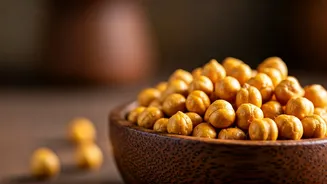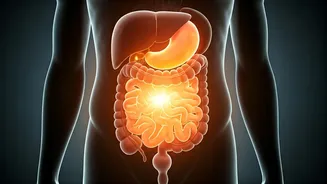Chickpeas' Rise to Fame
Chickpeas, also known as garbanzo beans, have become a culinary star in recent years, particularly in their roasted form. Their appeal is widespread because
they offer a satisfying crunch and a savory taste, making them a good alternative to chips and other less nutritious snacks. Furthermore, they are celebrated for being a source of plant-based protein, which is vital for muscle growth and repair, and are rich in fiber, which aids digestion and promotes satiety. The increased interest in plant-based diets and the rising awareness of the benefits of protein have accelerated the popularity of roasted chickpeas. This rise indicates a shift towards healthy snacking habits. However, it's essential to understand that not all roasted chickpeas are made equal; the way they are prepared significantly impacts their nutritional value.
Nutritional Breakdown
Roasted chickpeas offer a range of nutrients. They are a valuable source of protein, essential for body functions, and can be an excellent choice for individuals who avoid meat. A serving provides a significant amount of dietary fiber, crucial for gut health and regulating blood sugar levels. Furthermore, chickpeas contain a variety of vitamins and minerals, including iron, which helps transport oxygen throughout the body; magnesium, important for muscle and nerve function; and folate, essential for cell growth and development. However, it's important to remember that the nutritional content can vary based on the roasting method and the ingredients added. Excess salt and oil can increase the calorie count and diminish the health benefits. Reading labels and preparing chickpeas at home gives you more control over the ingredients, allowing you to maximize their nutritional value.
Dietitians' Perspectives
Dietitians often highlight the potential benefits of roasted chickpeas while also emphasizing the need for caution. They commend the protein and fiber content, which contributes to fullness and may aid in weight management. These professionals also remind consumers to pay close attention to the ingredient lists. Many commercially prepared roasted chickpeas have high sodium levels, which may be detrimental to those with hypertension or other health conditions. They also suggest homemade versions for better control over seasoning and portion sizes. This approach helps people benefit from the nutrients in chickpeas without the unnecessary additions. Dietitians propose incorporating roasted chickpeas as part of a balanced diet, alongside fresh vegetables, fruits, and lean proteins, for a healthy meal plan.
How To Consume Them
Roasted chickpeas can be incorporated into your diet in numerous ways. They serve as a quick snack, eaten on their own. They can also be added to salads, providing a crunchy texture and extra protein. Mixing them into soups or stews gives body and flavor. For a more satisfying meal, combine them with other ingredients. For instance, consider a chickpea and vegetable curry for a balanced dinner. You can also experiment with different flavor combinations. Spices like cumin, paprika, and garlic powder can be added for enhanced taste. Preparing chickpeas at home allows you to adjust the seasoning to suit your preferences and dietary needs. This adaptability makes roasted chickpeas a versatile and convenient addition to a healthy eating plan.
Potential Drawbacks
While roasted chickpeas offer several benefits, awareness of possible drawbacks is important. Like all legumes, chickpeas contain compounds that can cause digestive issues in some people. These compounds include certain carbohydrates that can lead to gas, bloating, and discomfort. For those sensitive to these effects, portion control is key. Starting with small servings and gradually increasing intake can help your body adjust. Also, it’s worth noting that some people may have an allergy or intolerance to chickpeas, leading to adverse reactions. If you experience unusual symptoms after consuming roasted chickpeas, consulting a healthcare professional is wise. Furthermore, the way chickpeas are prepared matters. Methods involving excessive oil or salt can affect the overall health benefits. The selection of chickpeas should be based on individual dietary needs and preferences.

















